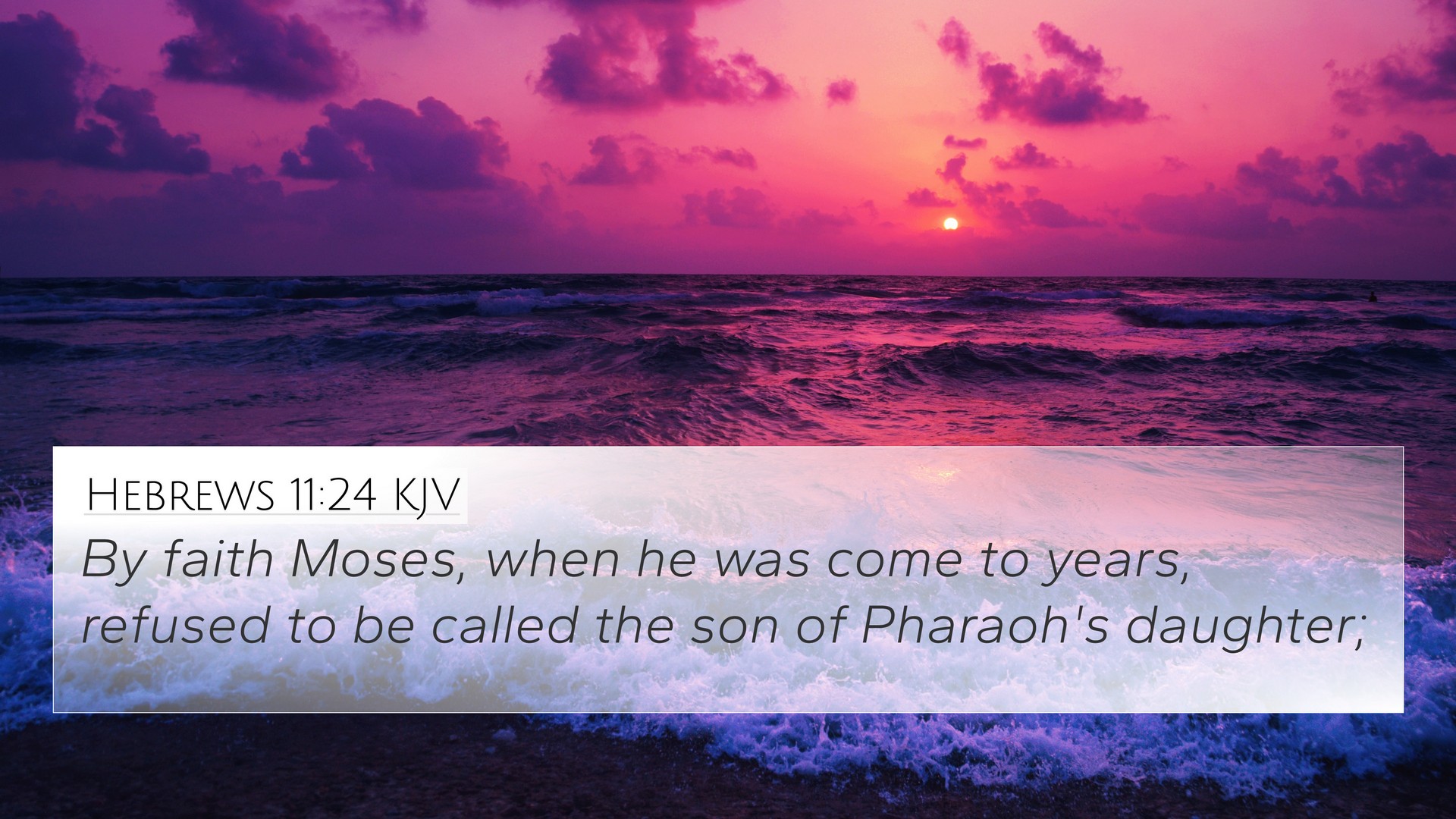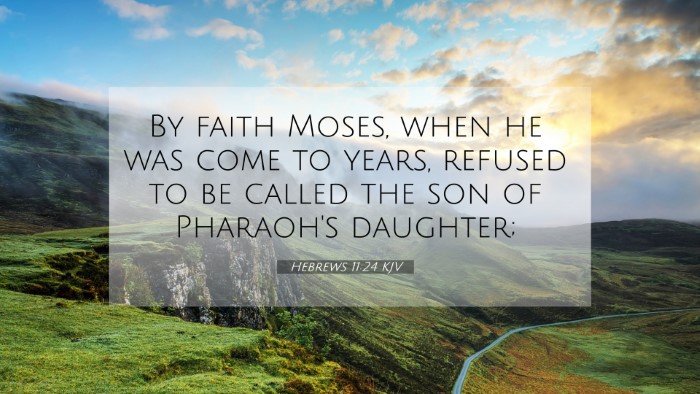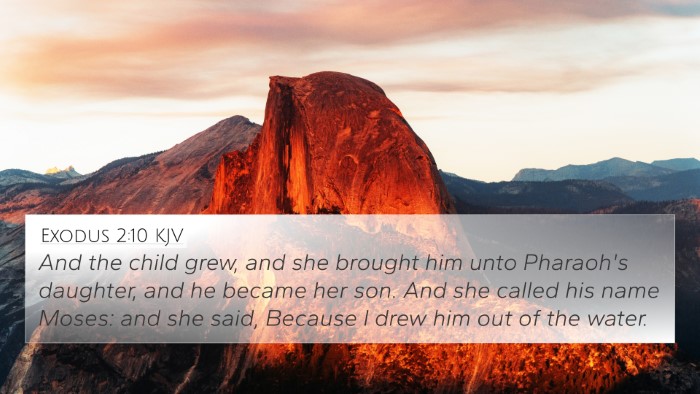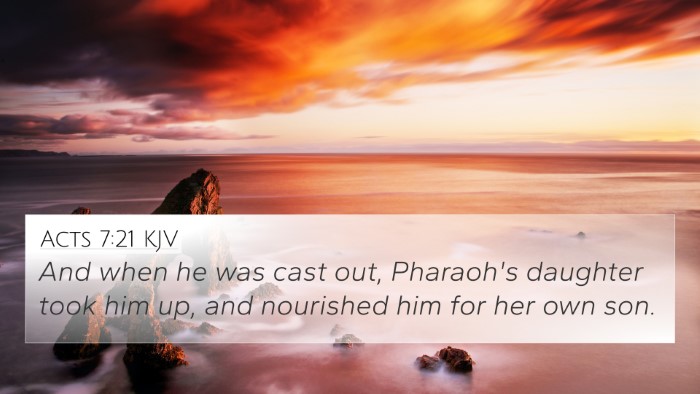Understanding Hebrews 11:24
Hebrews 11:24 states: "By faith Moses, when he was grown, refused to be called the son of Pharaoh's daughter." This verse highlights a monumental decision in the life of Moses, showcasing how faith can lead individuals to reject worldly advantages in favor of spiritual truths.
Summary of Meaning
The essence of Hebrews 11:24 reflects Moses' profound choice—an act grounded in faith rather than position or privilege. This rejection of the identity offered by Pharaoh's household illustrates how faith can transcend earthly titles and foster a deeper commitment to God’s calling.
Commentary Insights
Matthew Henry's Commentary
Matthew Henry elaborates on this verse, suggesting that Moses’ decision symbolizes the choice between the fleeting pleasures of sin and the eternal rewards of serving God. Henry emphasizes that such faith is not merely passive belief but an active decision to align oneself with God’s people.
Albert Barnes' Notes
Barnes reflects on the implications of Moses' choice. He notes that this act of faith was not only a personal decision but also a pivotal moment for the Israelites. By refusing a life of ease within Egyptian royalty, Moses embraced the burdens and call of leading his people toward liberation.
Adam Clarke's Commentary
Adam Clarke provides a historical context, highlighting the significance of Moses' upbringing and the gravity of his choice. He points out that despite potential societal advantages, Moses prioritized his divine heritage, indicative of the greater value he placed on spiritual heritage over earthly recognition.
Bible Verse Cross-References
This verse connects closely with several other biblical passages that underscore similar themes of faith and identity. Here are some significant cross-references:
- Exodus 2:10: Moses is drawn from the water, establishing his unique identity as both an Egyptian and a Hebrew.
- Hebrews 11:25: Highlights Moses’ choice to suffer affliction with the people of God instead of enjoying the pleasures of sin.
- Acts 7:22-23: Stephen's recounting of Moses educates on his leadership development and the early signs of his destiny.
- Romans 8:17: Discusses the theme of suffering and glory, aligning Moses' choices with Christian identity.
- Philippians 3:8: Paul expresses a similar sentiment of counting all things as loss for the sake of knowing Christ, akin to Moses' rejection of Pharaoh's daughter.
- 2 Corinthians 4:18: Suggests a focus on the unseen eternal instead of the temporal, echoing Moses’ priorities.
- 1 John 2:15-17: Cautions against the love of the world, illustrating the conflict Moses faced.
Connections Between Bible Verses
The story of Moses exemplifies the overarching biblical theme of faith leading to decisive action against worldly temptations. This relationship can be seen through:
- Moses and the Prophetic Tradition: His life foreshadows the Messiah, highlighting similar choices of self-denial for divine purposes.
- Faith of the Hebrews: Linked with the faith displayed by the Israelites during the Exodus under Moses’ leadership.
- Comparative Analysis with Jesus: Christ also faced temptations of glory, choosing the path of suffering for humanity's redemption.
Thematic Bible Verse Connections
The verse reflects broader biblical themes, bringing forth connections like:
- Identity and Heritage: Emphasizes the strength found in understanding one’s spiritual lineage.
- Faith versus Fear: Contrasts worldly fears against the courage found in faith, as exhibited by various figures throughout the scripture.
- Covenant Community: Links to the significance of communal identity in God’s promises.
Tools for Bible Cross-Referencing
For deeper study, consider utilizing tools such as:
- Bible Concordance: Helps locate passages related to faith and identity.
- Bible Cross-Reference Guide: Assists in exploring the connections between Moses and other biblical figures.
- Cross-Reference Bible Study: Engages with themes of faith across both testaments.
Practical Application
As we reflect on Hebrews 11:24, we are reminded of the weight of our choices. In a world filled with distractions and pressures to conform, Moses’ example prompts us to evaluate our own faith journeys. Are we willing to stand firm in our identity as children of God, even at a cost? Embrace this legacy of faith, knowing that every choice inspired by God’s call can lead to profound impact and eternal significance.




